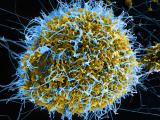A Lassa fever vaccine candidate was safe and produced a strong immune response in adults in the United States and Liberia, researchers reported this week in the New England Journal of Medicine.
The results are from a phase 1 clinical trial investigating the safety and immunogenicity of rVSVΔG-LASV-GPC, a replication-competent recombinant vesicular stomatitis virus–vectored vaccine encoding a Lassa virus (LASV) glycoprotein complex. Developed at the Public Health Agency of Canada and licensed by the International AIDS Vaccine Initiative (IAVI), the vaccine is based on a platform also used for Ervebo, the Ebola virus vaccine that was approved by the US Food and Drug Administration in 2019 and has been used in ring vaccination campaigns during Ebola outbreaks.
Transmitted primarily by rodents, Lassa fever is, like Ebola, a viral hemorrhagic disease. Lassa is estimated to cause 100,000 to 300,000 infections annually, including 5,000 to 10,000 deaths, mostly in West Africa, though the true public health impact remains unknown. The virus is endemic in Guinea, Liberia, Mali, Nigeria, and Sierra Leone, and other countries in the region are at risk of human Lassa fever cases and outbreaks.
Travel-related cases have also been reported around the world, and climate change threatens to create more endemic regions in Africa. No vaccine is currently available.
"A vaccine is urgently needed as shifting patterns in climate, migration, and human-animal interaction may expand Lassa's footprint across West Africa and even further afield," senior author Swati Gupta, DrPH, MPH, vice president and head of emerging infectious diseases and epidemiology at IAVI, said in an IAVI news release.
No serious adverse events, robust immune response
For the trial, a team of US, British, and Liberian investigators led by IAVI enrolled and randomly assigned healthy adults in the United States (44 participants) and Liberia (60) in a 4:1 ratio to receive rVSVΔG-LASV-GPC at one of four dose levels, or a placebo. One group was invited to receive a second dose of the vaccine 6 to 20 weeks after administration of the first dose. The trial was conducted from July 2021 through December 2023.
The participants were followed up for a year, with investigators evaluating the safety and side-effect profile at various dose levels. Secondary end points included levels of binding antibodies against LASV glycoprotein, neutralizing antibodies, and vaccine vector–derived viral RNA and plaque forming units in plasma, urine, and saliva.
The vaccine caused transient local reactions (primarily tenderness and pain at the injection site) and systemic reactogenicity events (mostly malaise), but no serious adverse events were reported, including hearing loss, which is a known risk of LASV infection. Reactogenicity was lower in Liberian participants than in US participants.
A vaccine is urgently needed as shifting patterns in climate, migration, and human-animal interaction may expand Lassa's footprint across West Africa and even further afield.
Analysis of secondary outcomes showed robust and long-lasting cellular and humoral (binding and neutralizing) responses that cross-reacted against common LASV lineages known to circulate in West Africa, at all dose levels. A second dose provided no appreciable benefit to humoral or cellular responses, the investigators said.
No infectious vaccine virus particles were found in plasma, urine, or saliva.
The authors say the results are consistent with those from preclinical trial of the vaccine but caution that the trial included a relatively small sample, and that several US participants were lost to follow-up, while some of the Liberian participants had preexisting antibodies to LASV. They note that a larger phase 2 trial is under way in West Africa to confirm the findings, expand the safety profile, and assess immunogenicity in LASV-exposed populations.
The trial was funded by the Coalition for Epidemic Preparedness Innovations and the US National Institute of Allergy and Infectious Diseases.





















